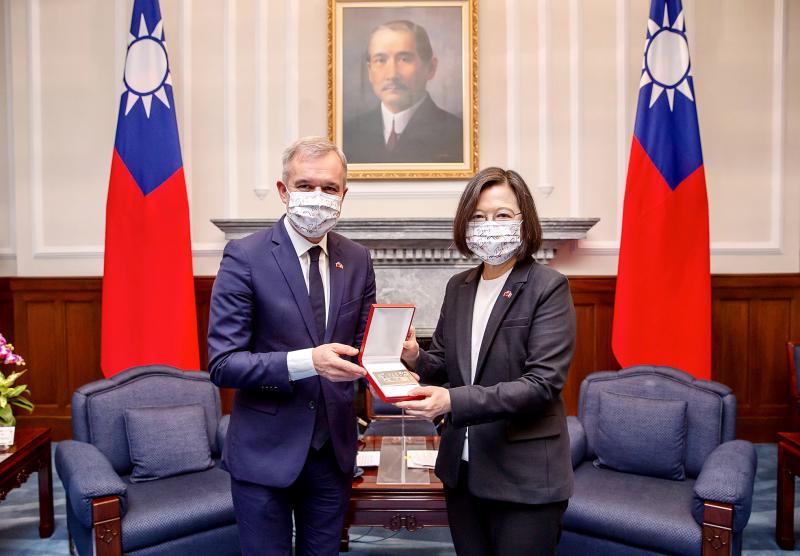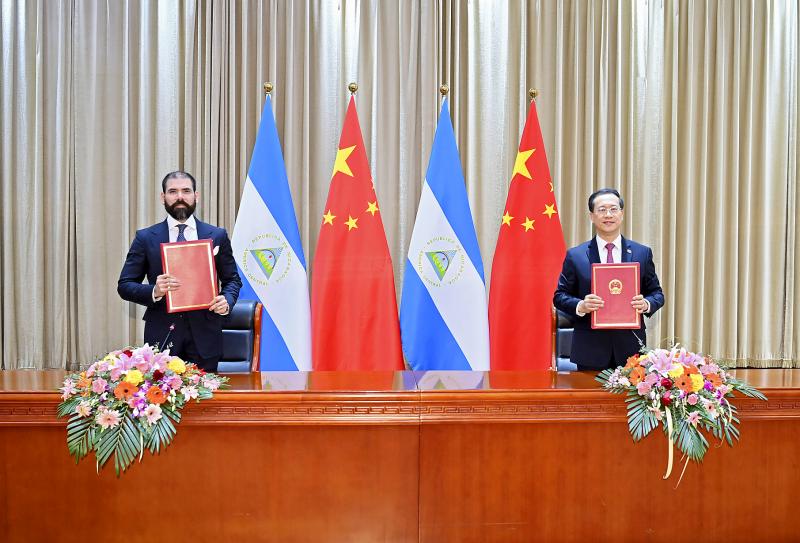In 2013 Gambia, then ruled by dictator Yahya Jammeh, broke off diplomatic relations with Taiwan. Badly in need of funds, it had declared itself an Islamic Republic in the hope of prying some cash out of Saudi Arabia and Iran, rivals for influence in the Islamic world. Apparently Jammeh thought he could get some money out of China if he dumped Taiwan.
Unfortunately for him, China waited until March of 2016 to establish relations with Gambia. With only a few months left in the two-term presidency of the pro-China Ma Ying-jeou (馬英九), for many in the media, Beijing could only have been signaling incoming — and pro-Taiwan — president Tsai Ing-wen (蔡英文).
The deportations of Taiwanese scam suspects from Kenya to China occurred the following month, again widely interpreted in the media as a signal to Tsai. Indeed, the Economist observed, referring to the “drop” in Chinese tourists, the Kenya deportations and the Gambia affair: “Since January, China has turned to its usual battery of economic, diplomatic and strong-arm methods to bring Ms Tsai into line.”

Photo: EPA-EFE
The problem? The number of tourists was rising at the time, the pick up of Gambia was likely not a signal to Tsai but instead related to Beijing’s policies in the Islamic world, while the Kenya deportations were arranged over a year before she was elected and were in response to decisions taken by the Ma administration.
That media interpretation was a reminder of the once-pervasive media double standard on the Chinese Nationalist Party (KMT) and the Democratic Progressive Party (DPP) — negative actions by Beijing are never negative signals to the KMT, only to the DPP. They also symbolized the international media’s commitment to interpreting everything within the framework of the cross-strait sovereignty clash.
My, how things have changed. Last week when Nicaragua switched from Taiwan to China, the media gave a gigantic shrug. Nobody blamed the Tsai administration. CNN even scribed: “Under Xi [Jinping, 習近平], relations between Taipei and Beijing have deteriorated to levels not seen in decades,” appearing to blame China for the current tensions. Yay!

Photo: AP
Reuters laid the problem at Washington’s door. “The break with Taiwan is a blow to the United States. It follows months of worsening ties between Ortega and Washington…”
The sea change in the media’s positioning of Taiwan and Tsai reflects the changing international environment for Taiwan as China continues to sink its reputation abroad and boot out media workers, sending some here to Taiwan to experience our warm welcomes firsthand. Thanks, Beijing, for creating more sympathetic, knowledgeable voices for Taiwan.
Meanwhile, as Gerrit van der Wees chronicled this week in the Diplomat (“Is Taiwan’s International Space Expanding or Contracting?”, Dec. 14), in the last few months Japan has affirmed its support for Taiwan and its security, while Australian Defense Minister Peter Dutton signaled that Australia would help the US in a Taiwan scenario.
Most importantly, Beijing’s mishandling of its economic and political relations with Europe, symbolized by its bullying of Lithuania, has pushed Europe closer to Taiwan.
Another key change took place at home. In 2019, when Taiwan lost two “diplomatic allies” in a week, the KMT demanded that Tsai sack Minister of Foreign Affairs Joseph Wu (吳釗燮).
This time, the KMT simply said on Twitter: “KMT Chairman Eric Chu (朱立倫) condemns Nicaragua for severing ties w/ the Republic of China & deeply regrets BJ’s continuously sought to suppress our int’l presence & seize our diplomatic relations.” In other public statements, while making pro-forma attacks on Tsai, Chu accused Nicaragua of “bad faith.”
Tsai’s policy with the nation’s “diplomatic allies” has been as low-key as everything else about her. She has stated that the nation will not return to the “dollar diplomacy” of the Chen Shui-bian (陳水扁) years, when Taiwan’s foreign aid resembled thinly disguised showers of bribes, but would instead continue the Ma administration’s program of more carefully accounting for every aid dollar.
In 2019 the People’s Daily threatened that if Tsai were re-elected, sooner or later Taiwan would not have any diplomatic allies “as long as the DPP is in power.” Beijing frequently blusters, but Tsai was re-elected nearly two years ago and so far only Nicaragua has switched sides — and that for its own domestic reasons.
Why isn’t poaching Taiwan’s allies more of a priority? Few of them are important to Taiwan economically. Moreover, losing them has little effect on Tsai’s standing with the public while not helping Beijing’s ally in Taiwan, the KMT.
Two years ago Timothy Rich, associate professor of political science at Western Kentucky University, surveyed Taiwanese on their diplomatic relations. His research found that if asked whether diplomatic relations with the “allies” were important, 58.7 percent answered in the affirmative. If it hurt relations with China, the number soared to 70 percent. If money had to be spent, it fell to just 41.6 percent. If it hurt relations with China but money had to be spent, it still rose from the 58 percent baseline to 61.6 percent.
Clearly, the public likes “allies” because they like poking betel-nut stained fingers into China’s eye, but they don’t take them very seriously when they cost money. Similarly, a 2019 Taiwanese Public Opinion Foundation poll found that 53 percent of the public does not worry about losing “allies.”
Two other factors are likely in play. The first is that Taiwan’s rising standing in the world has rendered losses of “allies” moot. A decade or two ago the international media would speculate that a lost ally would trigger a cascade of switches to Beijing and play up Taiwan’s “isolation.”
Today Taiwan’s “informal” relations are strong and still gathering steam. As Beijing’s insensate, impotent reaction to the Zoom meeting the US called the Summit for Democracy showed, while Beijing can poach allies, it can do little to halt this momentum. Indeed, attempting to slow Taiwan’s informal rise has generally fueled it even more.
The other factor is that the “allies” don’t prop up Taiwan. Instead, they support the Republic of China (ROC) government, recognizing it as the sole government of China. Knocking them off formally isolates Taiwan in the world, providing greater impetus for the country to move toward formal independence.
That is one reason that many advocates of independence argue that the loss of allies is a good thing in the long run: it accelerates the day the ROC, and its claims that overlap so dangerously with those of Beijing, disappear.
Good riddance.
Notes from Central Taiwan is a column written by long-term resident Michael Turton, who provides incisive commentary informed by three decades of living in and writing about his adoptive country. The views expressed here are his own.

Jacques Poissant’s suffering stopped the day he asked his daughter if it would be “cowardly to ask to be helped to die.” The retired Canadian insurance adviser was 93, and “was wasting away” after a long battle with prostate cancer. “He no longer had any zest for life,” Josee Poissant said. Last year her mother made the same choice at 96 when she realized she would not be getting out of hospital. She died surrounded by her children and their partners listening to the music she loved. “She was at peace. She sang until she went to sleep.” Josee Poissant remembers it as a beautiful

For many centuries from the medieval to the early modern era, the island port of Hirado on the northwestern tip of Kyushu in Japan was the epicenter of piracy in East Asia. From bases in Hirado the notorious wokou (倭寇) terrorized Korea and China. They raided coastal towns, carrying off people into slavery and looting everything from grain to porcelain to bells in Buddhist temples. Kyushu itself operated a thriving trade with China in sulfur, a necessary ingredient of the gunpowder that powered militaries from Europe to Japan. Over time Hirado developed into a full service stop for pirates. Booty could

Before the last section of the round-the-island railway was electrified, one old blue train still chugged back and forth between Pingtung County’s Fangliao (枋寮) and Taitung (台東) stations once a day. It was so slow, was so hot (it had no air conditioning) and covered such a short distance, that the low fare still failed to attract many riders. This relic of the past was finally retired when the South Link Line was fully electrified on Dec. 23, 2020. A wave of nostalgia surrounded the termination of the Ordinary Train service, as these train carriages had been in use for decades

Lori Sepich smoked for years and sometimes skipped taking her blood pressure medicine. But she never thought she’d have a heart attack. The possibility “just wasn’t registering with me,” said the 64-year-old from Memphis, Tennessee, who suffered two of them 13 years apart. She’s far from alone. More than 60 million women in the US live with cardiovascular disease, which includes heart disease as well as stroke, heart failure and atrial fibrillation. And despite the myth that heart attacks mostly strike men, women are vulnerable too. Overall in the US, 1 in 5 women dies of cardiovascular disease each year, 37,000 of them